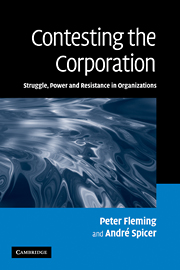Book contents
- Frontmatter
- Contents
- Acknowledgements
- Introduction: Prisons, playgrounds and parliaments
- Part 1 Theoretical framework
- Part 2 Forms of resentful struggle
- 4 Dis-identification and resentment: the case of cynicism
- 5 Desexualizing work and the struggle for desire
- 6 Displacement and struggle: space, life and labour
- Part 3 Overt, organized and collective struggle
- Conclusion
- Notes
- References
- Index
6 - Displacement and struggle: space, life and labour
Published online by Cambridge University Press: 13 January 2010
- Frontmatter
- Contents
- Acknowledgements
- Introduction: Prisons, playgrounds and parliaments
- Part 1 Theoretical framework
- Part 2 Forms of resentful struggle
- 4 Dis-identification and resentment: the case of cynicism
- 5 Desexualizing work and the struggle for desire
- 6 Displacement and struggle: space, life and labour
- Part 3 Overt, organized and collective struggle
- Conclusion
- Notes
- References
- Index
Summary
[o]ne is never finished with anything – the corporation, the educational system, the armed services being metastable states coexisting in one and the same modularity, like a universal system of deformation.
(Deleuze, 1992: 5)A common refrain heard among many workers in organizations today is the following: ‘I am a different person at work from how I am at home, but with the demands put upon me now I find it difficult to keep the two separated.’ For sure, the idea of a ‘place of work’ in which we give up or repress those aspects of our selves associated with leisure or the home is a very peculiar historical achievement. As the English historian E. P. Thompson (1967) points out, this achievement that we now take for granted emerged from estrangement, conflict and pain. The spatial demarcation of work from ‘life’ represents a major break from previous economic regimes, in which space, life and labour were all highly integrated.
The spatiality of organizational power and resistance relations has received little attention in employment studies, which perhaps reflects the ease with which sometimes highly unusual configurations of space can become normalized. We argue in this chapter that newly emerging work forms involve struggle around the meaning and utility of space. Organizational space involves relations of force and domination in which place comes to signify the desirability of certain behaviours and meanings above others. These meanings are highly contested by various parties.
- Type
- Chapter
- Information
- Contesting the CorporationStruggle, Power and Resistance in Organizations, pp. 108 - 128Publisher: Cambridge University PressPrint publication year: 2007

